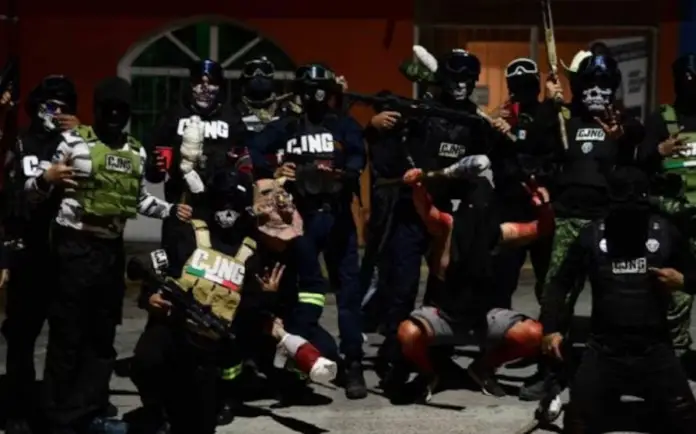The Michoacán government warned about the recruitment of foreigners by the Jalisco New Generation Cartel (CJNG) to intensify violence in the region.
According to statements by Governor Alfredo Ramírez Bedolla, the involvement of Colombian and Salvadoran citizens in criminal activities linked to organized crime in the state has been identified.
Journalistic investigations have revealed that the CJNG has implemented strategies to attract former Colombian military personnel and former guerrillas, especially those with experience in the Revolutionary Armed Forces of Colombia (FARC).
Carlos Torres Piña, state government secretary, added that some foreign operators not only come to generate violence, but also train hitmen to assemble explosive devices and deploy them on drones to confront other criminal groups and even federal forces.
“Both in the operations where weapons have been detained, as well as in the confrontations where Colombians have been killed, this is what gives us the indication that, without being hired, they participate and work for organized crime in Michoacán,” the governor stated.
These individuals are recruited through false job offers, promising them work as bodyguards or guarding avocado orchards. Once in Mexico, they are transferred to training camps in the mountainous areas of Michoacán and Jalisco, where they are forced to participate in criminal activities, including armed confrontations and the manufacture of explosives.
For his part, the head of the State Attorney General’s Office, Adrián López Solís, emphasized that 10 operators have been arrested in Michoacán alone: eight Venezuelans, one Honduran, and one Guatemalan. Of those detained, the majority belonged to the CJNG, highlighted the local Secretary of Public Security, Juan Carlos Oseguera Cortés.
Most Representative Cases of Foreigners Within the CJNG’s Ranks
One of the most notorious cases is that of Elkin Pérez Loaiza, alias “El Tigre,” a former Colombian military officer with knowledge of military intelligence and explosives. Pérez Loaiza operated under the orders of Nicolás Sierra Santana, leader of “Los Viagras,” and was responsible for training hitmen in the use of drones loaded with explosives used against rival groups and security forces in municipalities such as Apatzingán, Buenavista, and Tepalcatepec.
Furthermore, testimonies from Colombian ex-combatants who managed to escape from the CJNG have been documented. These accounts describe conditions of extreme coercion, where recruits were forced to commit violent acts under threat of death. One of them recounted that, after refusing to kill an innocent peasant, he was threatened with death by his superiors.
The presence of foreigners in the ranks of the CJNG has intensified clashes in Michoacán. In August 2024, eight members of the Coahuayana self-defense forces were killed in an ambush attributed to the CJNG. The attackers used a “monster truck,” a homemade armored vehicle, to carry out the attack.
The state government recognized the need to strengthen security measures and has requested federal support to combat the growing influence of the CJNG in the region. However, the infiltration of foreigners into the cartel’s structures represents an additional challenge for authorities, who must confront not only local violence but also the military tactics and knowledge brought by these international recruits.
In conclusion, the CJNG’s strategy of recruiting foreigners, especially former Colombian military personnel, has contributed to the escalation of violence in Michoacán. This situation underscores the need for a coordinated and effective response by Mexican authorities to confront the threats posed by these transnational criminal groups.

Source: infobae




